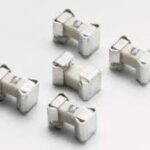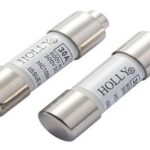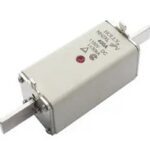Fuses
A fuse is an essential safety component in electrical circuits, designed to interrupt current flow when it exceeds a specific threshold—protecting components from damage caused by overcurrent conditions. The core of a fuse is a metal wire or strip with very low resistance, placed between two terminals. When excessive current flows through the circuit, the heat generated causes the fuse element to melt (or “blow”), creating an open circuit and stopping the flow of electricity.
Fuses are typically classified by their response time:
Fast-blow fuses react quickly to sudden surges.
Slow-blow fuses tolerate short-term inrush currents and are better suited for circuits with temporary spikes, such as motors or power supplies.
Some fuses are self-resetting (such as PTC thermistors), which automatically reconnect the circuit once the overload condition is resolved.
Materials and ConstructionThe fuse element is usually made from metals like zinc, copper, silver, or aluminum. The fuse body may be constructed from glass, ceramic, metal, or fiberglass, depending on the intended application and environmental requirements.
Mounting OptionsFuses can be:
Soldered directly to the printed circuit board (PCB), or
Installed in fuse holders, which allow for easy replacement without de-soldering.
Specifications and ApplicationsFuses are rated based on key parameters such as:
Maximum current (amp rating)
Operating voltage
Response time (blow speed)
Interrupting (breaking) capacity
Fuses are available in a wide range of sizes and types to suit various industries. For example:
Automotive fuses protect electrical systems in vehicles.
High-voltage fuses safeguard transformers and metering equipment in power distribution systems.
At IBS Electronics, we offer a broad selection of fuses for general-purpose, automotive, industrial, and high-reliability applications—ensuring safety and performance across your designs.
Showing 1–9 of 197 results
-

06F-0200L1 Hollyfuse 50A SMD Fuse 200mA 32V 0603 Fuses ROHS 603 Tape & Reel (TR)
Read more -

14GPV15U15 Hollyland Photovoltaic Fuse 1500V 15A Cartridge
Read more -

14GPV5U15 Hollyland Photovoltaic Fuse 1500V 5A Cartridge
Read more -

14gPV5U15 Hollyland Photovoltaic Fuse 5A 1500V Cartridge
Read more -

1XLgPV100U15A Hollyfuse photovoltaic Fuse 1500V 100A 34W Axial Fuse block
Read more -

1XLgPV100U15A2 Hollyfuse photovoltaic Fuse 1500V 100A 34W Axial Fuse block
Read more -

1XLgPV100U15B Hollyfuse photovoltaic Fuse 1500V 100A 34W Axial Fuse block
Read more -

1XLgPV100U15BC Hollyfuse photovoltaic Fuse 1500V 100A 34W Axial Fuse block
Read more -

1XLgPV125U15A Hollyfuse photovoltaic Fuse 1500V 125A 42W Axial Fuse block
Read more
